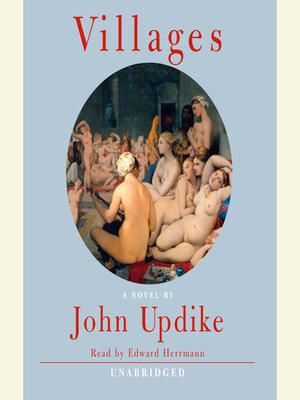
Sign up to save your library
With an OverDrive account, you can save your favorite libraries for at-a-glance information about availability. Find out more about OverDrive accounts.
Find this title in Libby, the library reading app by OverDrive.



Search for a digital library with this title
Title found at these libraries:
| Library Name | Distance |
|---|---|
| Loading... |
A delightful, witty, passionate novel that follows its hero from the Depression era to the early twenty-first century—from a master of American letters and the Pulitzer Prize-winning author of the acclaimed Rabbit series.
John Updike’s twenty-first novel, a bildungsroman, follows Owen Mackenzie from his birth in the semi-rural Pennsylvania town of Willow to his retirement in the rather geriatric community of Haskells Crossing, Massachusetts.
In between these two settlements comes Middle Falls, Connecticut, where Owen, an early computer programmer, founds with a partner, Ed Mervine, the successful firm of E-O Data, which is housed in an old gun factory on the Chunkaunkabaug River. Owen’s education (Bildung) is not merely technical but liberal, as the humanity of his three villages, especially that of their female citizens, works to disengage him from his youthful innocence. As a child he early felt an abyss of calamity beneath the sunny surface quotidian, yet also had a dreamlike sense of leading a charmed existence.
The women of his life, including his wives, Phyllis and Julia, shed what light they can. At one juncture he reflects, “How lovely she is, naked in the dark! How little men deserve the beauty and mercy of women!” His life as a sexual being merges with the communal shelter of villages: “A village is woven of secrets, of truths better left unstated, of houses with less window than opaque wall.”
This delightful, witty, passionate novel runs from the Depression era to the early twenty-first century.
John Updike’s twenty-first novel, a bildungsroman, follows Owen Mackenzie from his birth in the semi-rural Pennsylvania town of Willow to his retirement in the rather geriatric community of Haskells Crossing, Massachusetts.
In between these two settlements comes Middle Falls, Connecticut, where Owen, an early computer programmer, founds with a partner, Ed Mervine, the successful firm of E-O Data, which is housed in an old gun factory on the Chunkaunkabaug River. Owen’s education (Bildung) is not merely technical but liberal, as the humanity of his three villages, especially that of their female citizens, works to disengage him from his youthful innocence. As a child he early felt an abyss of calamity beneath the sunny surface quotidian, yet also had a dreamlike sense of leading a charmed existence.
The women of his life, including his wives, Phyllis and Julia, shed what light they can. At one juncture he reflects, “How lovely she is, naked in the dark! How little men deserve the beauty and mercy of women!” His life as a sexual being merges with the communal shelter of villages: “A village is woven of secrets, of truths better left unstated, of houses with less window than opaque wall.”
This delightful, witty, passionate novel runs from the Depression era to the early twenty-first century.







